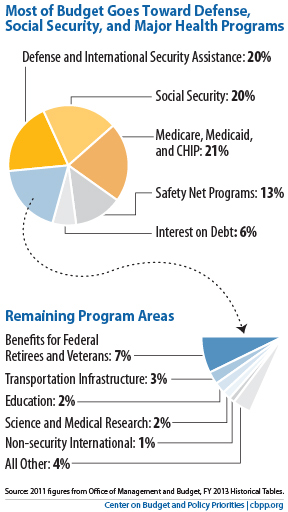A few days ago I saw this chart in an article in the Washington Post on the DoD budget:
The chart breaks down spending by area for FY13, the current fiscal year. It indicates that 13% of expenditures go towards safety net programs, 3% goes towards transportation and infrastructure, 2% goes towards education, and 2% goes towards scientific and medical R&D. So almost twice as much is being spent on safety net programs as the latter three areas combined. (Safety net spending is high by historical norms because the economy is still spluttering along and many more people than usual are making use of it.) My question: Why not shift spending from Safety Net to transportation, education, and science & medical R&D then hire unemployed people, i.e., people who are making use of safety net programs, to build roads, fix bridges, teach, do R&D, etc.? (Obviously train them as necessary beforehand.) Why would that not be a more productive use of resources than the current arrangement?
I don’t know too many unemployed people but the ones who are really want to work. Provide them an opportunity to do so and realize significant public benefits in the process. How is that not win-win?


Optimistic view. That same group wouldn’t be qualified to teach or do R and D. And construction looks a lot like work. Why do any of those things when I can get a check for sitting inside?
What I had in mind was a shift in resources currently allocated for long term unemployment benefits. It’s optimistic to think that such a policy change will happen. I don’t believe it’s optimistic to think people will take to it.
I think you underestimate what people are capable of. In this region at least – admittedly, that’s a huge qualifier – you’ve got a lot of white color professionals in the ranks of the long term unemployed. They are capable of teaching and doing R&D. In fact, I know two who are good at it. Unfortunately, their skill sets don’t match up with current job openings. (Jk. LOL. What job openings?) One has found part-time work as a substitute teacher at a local high school but she’s still having to burn through savings to pay bills.
Granted, a 59-year-old ex-middle-manager at a bank isn’t likely to be suited to working construction but there are other options, see, e.g., http://harpers.org/archive/2011/12/more-government-please/
Long term unemployed people aren’t hanging out taking vacations. There are still many applicants for each job opening (four? six? was about seven or eight per a few years back IIRC). Researchers have compared groups of unemployed who receive unemployment benefits with those who don’t. The former don’t take particularly longer to find a job – IIRC, estimates are that the unemployment rate is about 1.1x what it would be if there were no unemployment benefits. From that, as plus some anecdotal evidence, I conclude that getting the benefits check just takes the edge off – helps pay for groceries, the mortgage, etc. – while people look for work. It doesn’t make them lazy.
I moved 1500 miles to a strange town, reentered military service and went to war 4 times to pay the bills when my company laid me off (for 7 out of the past ten years; still laid off). I haven’t taken a cent of unemployment. I guess I’m hard to impress when it comes to how hard people are struggling to find work.